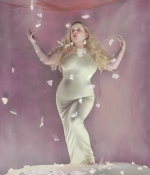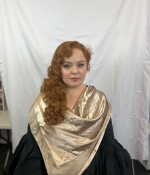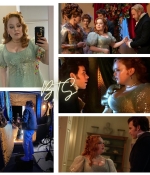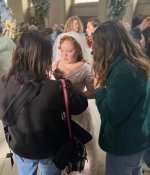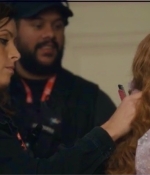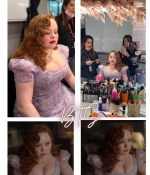Teachers at my children’s school look away now. I’ve allowed my teenage daughters to bunk off class this morning to benefit from the alternative educational experience of meeting one of their acting heroes. And here she is now on Zoom from London: Nicola Coughlan, in a black dress I very much doubt she picked up in Penneys, with gold rings glinting on her fingers.
The Galway woman does not disappoint two of her biggest fans, giving the girls an enthusiastic wave and a friendly hello before Coughlan and I get down to the admittedly more professional business of discussing her storming successes in the acting world, from the life-changing magic of playing Clare Devlin aka the “wee lesbian” in Derry Girls, to a delicious, Nobel Prize-themed cameo in Greta Gerwig’s Barbie. Now, after two seasons of portraying the bookish wallflower Penelope Featherington in Netflix show Bridgerton, she is set to re-emerge as the lead character of season three of Shonda Rhimes’ groundbreaking and bodice-sundering period drama.
Writing in Harper’s Bazaar recently, where Coughlan is the cover star draped in Van Cleef & Arpels jewels and designer gowns, she said she found it hard to fathom that she was playing a romantic lead. “I’m in disbelief that I’m the leading lady in a romance show. And it’s not because I find myself hideous, as some people have assumed when I say that (I’ll have you know, in the right lighting I’m a solid seven), but because it’s not something I ever dreamed of.”
I tell her she’s selling herself short with “a solid seven”. Dewy-skinned and twinkly blue of eye, she’s at least a nine in any lighting, in my opinion. I’m happy to report she doesn’t disagree or attempt to deflect the compliment.
It’s funny, honestly. I wrote about that, because I think people take it the wrong way. They think I’m saying I’m a hideous monster, so I could never play a romantic lead … but that’s not what I mean. It’s just that growing up that was not what I was drawn to. I loved all the gay icons. I wanted to be Judy Garland, Bette Midler, Liza Minnelli, Meryl Streep in Death Becomes Her. I loved those really over-the-top women. I just never wanted to be the object of affection that stands in the corner. But that’s what I really love about how they’ve written this season of Bridgerton because I get to be the romantic lead, but I still get to be funny. And Pen still gets to be sharp and clever. And really into her job as well as everything else.
If you are not one of the hundreds of millions who have streamed the show across the world since season one arrived like a candy-coloured breath of fresh air during the pandemic, here are some Bridgerton cliff notes. The show centres around the marriage market of Regency England, a place where eye-popping period costumes are worn by members of the Ton, a phrase used to describe British high society. Bridgerton, based on the books by Julia Quinn, landed in lockdown as an escapist, joyful, unapologetically sexy offering and audiences couldn’t get enough. Season one was watched by 82 million people when it first streamed on Netflix – at the time the most-watched show on that platform. One of the main twists was the end-of-season reveal that Coughlan’s character Penelope was the writer behind influential society gossip column Lady Whistledown. The fact that Lady Whistledown is voiced by Julie Andrews provided one of many pinch-me moments Coughlan, a huge fan of musical theatre and movies since childhood, has experienced in the last decade.
Each season of Bridgerton centres around one couple. This time, Coughlan as Penelope Featherington has a much fuller dance card than usual, being twirled around the floor at sumptuous marriage market parties backed by a classical orchestra playing Billie Eilish and Taylor Swift songs.
Using contemporary music in Regency times is just one of the show’s many stylish cultural twists. The show is also trailblazing in Shonda Rhimes’ decision from the beginning of Bridgerton to create a diverse cast. “She has genuinely changed the landscape of television,” as Coughlan puts it. “You see the Bridgerton Effect now everywhere in terms of diversity on screen … it used to just be acceptable to have all-white casts in period dramas and elsewhere, and it was like, no problem. But now the conversation has changed. Shonda has to take a huge amount of credit for that. It was also a risk. Because people like what they like, and they’re traditional, but she took this gamble and look how it has paid off. It’s amazing.”
Coughlan also says she is thrilled by how someone like Penelope Featherington, “the oddball in the corner” as she has described her character, and to some degree herself, can take centre stage in a romance saga. “Even if they don’t feel like they’re ready,” she smiles. “The great thing about signing a contract to work means even if you don’t think you can, you’re going to have to do it anyway. You better get it together. It’s your job.”
She’s talking about her trepidation around those famously raunchy Bridgerton sex scenes. Being the romantic lead in that show requires a certain loosening of not just restrictive corsets but of inhibitions. There is a particular scene in season three, set in a horse-drawn carriage with one of her love interests, dashing Colin Bridgerton (played by Luke Newton), which she will not be keen to watch with her mother at home in Galway.
“Luke and I talked about it a lot. We had an intimacy co-ordinator. But it’s not maybe how people imagine, it’s not like a dance routine – ‘you put your hand here, you kiss for two seconds, you pull away’. We had a lot of freedom.”
She tells a funny story about how, when filming the carriage sex scene, they were enclosed and alone for some of the shots. Their cue to end this particular scene was the carriage coming to a stop but they couldn’t hear the director as the vehicle was soundproofed so they ended up going on with the, er, action, for longer than necessary. “I was thinking, ‘This feels really long but just keep going, just keep going.’ At the end the director, who’d been shouting that the carriage had stopped, asked, ‘What were you doing?’ We couldn’t hear him,” recalls Coughlan, slightly mortified by the memory.
For much of the two previous seasons her character had felt downtrodden and dismissed. Season three sees her desperate to leave home and out for the third time in the cut-throat marriage market where nobody has any expectations of her finding a match. But soon the tables turn and nature-loving vegetarian Lord Debling is seeing her as a potential wife, and the Ton’s newly most-eligible bachelor and Penelope’s friend Colin Bridgerton’s nose is put out of joint.
It’s a really interesting moment with Penelope because she doesn’t see herself as desirable. Lord Debling is obviously not the love of her life or the guy she’s fantasised about for years. But he sees her as a woman, which was a big issue with Colin in season two. He said to Penelope, ‘you know, you’re not a woman, you don’t count, you’re just Pen,’ and she really took that to heart. So for Lord Debling to see her as a woman … it allows her to start to realise who she truly is.
Let’s talk about Coughlan and who she truly is. For a start she is someone who uses her now-huge platform to try to create change. A couple of years ago she left what she has described as the “cult” of Twitter but has nearly three million followers on Instagram. Her activism began when her influence was far smaller. In 2015, she went door-to-door canvassing for a Yes vote in the marriage equality referendum. By 2018 she was publicly supporting the Repeal the 8th campaign and the legalisation of abortion in Northern Ireland. Lately, she has been posting about the war in Gaza and calling for a ceasefire. She feels it’s important to use her platform even though it can expose her to criticism.
“I think you have to be led by your moral compass. And I don’t want that to sound worthy, but I do feel a massive weight of responsibility. Because I know how lucky I am to do the job I do and get to live the life I live. And if I can give anything back, whether if that puts me at risk, it puts me at risk. But I can’t close my eyes to things that are happening.”
Her late father was in the Irish Army and worked with the UN’s Truce Supervision Organisation. “My family lived in Jerusalem in the late 1970s. I think Irish people have a different perspective on things. I just want the best for all innocent people. The loss of civilian life, anywhere in the world, isn’t acceptable. I think it’s okay to stand against that. I have a platform. So if I can use it for good, and I can help raise money for charities, why wouldn’t I do that?”
Her activism has been centred around the scrutiny of women’s bodies – especially those, like herself, in the public eye. I venture that she might be sick of the subject but she says that she is more than happy to talk. She’s written about it before and once took to Twitter to politely ask people to stop commenting on her body shape. “If you have an opinion about my body please, please don’t share it with me … It’s really hard to take the weight of thousands of opinions on how you look being sent directly to you every day.” In 2018, the British Theatre Guide apologised to her after she complained about its male critic’s comment about her weight in a review. I wonder does she think the situation has improved since she first began talking about it a few years ago?
“No,” she says, bluntly. “People love to undermine women and their hard work. So I don’t think anything has improved unfortunately, but the only thing I can try and do is just go out there and do the best I can do with every job I’m given. And to hopefully get as many different roles as I can. All I care about is the work. Bodies change, if I lose weight or gain weight or I do anything it’s no one’s business, all I care about is doing good acting and being judged on that.”
Her wish to be judged on her acting has played out beautifully. Shonda Rhimes spotted her in Derry Girls and knew she had found her Penelope. Coughlan’s audition tape for Greta Gerwig’s phenomenally successful Barbie movie led to her being offered a substantial part, which she couldn’t accept because she was filming season two of Bridgerton. In the end, to her delight, they offered her a cameo.
It’s almost unfathomable that we’ve got this far in our conversation without talking about Clare Devlin and Derry Girls. There would have been no Coughlan as Clare without a certain off-West End play that could be characterised as her big break before her really big break happened. While working part-time in an opticians in Galway, nearing 30 and wondering if her acting dreams were ever going to come true, she entered an open call on social media to audition for the Old Vic in London. She beat thousands of other hopefuls and was cast in the lead in acclaimed play Jess and Joe Forever in 2016, which led to her getting signed with the Curtis Brown agency which in turn landed her the part in Derry Girls. How much does Derry Girls still mean to her?
“I mean, it’s incredible. The reach that that show had and continues to have. I meet people from all over the world, I used to get messages from people in Pakistan, saying ‘oh my gosh, this is me and my family.’ Brilliant writing is brilliant writing, you don’t have anything if you don’t have that, and of course wonderfully-drawn characters and a casting director like Carla Strong. I always feel casting directors don’t get nearly enough credit in this industry, honestly, because there’s a special alchemy of putting a cast together. You could, of course, get one good actor for a role, but it’s creating an ensemble, especially in comedy, that’s really important.”
She says she loves seeing the success of her fellow Derry Girls actors. Bafta-winning Siobhán McSweeney, aka eye-rolling Sister Michael, has become a regular on British television and stage. Louisa Harland, who played step aerobics-loving Orla, is currently starring as a gender non-conforming outlaw in the new Disney+ show Renegade Nell, while Dylan Llewellyn, who played hapless English lad James, has impressed in the acclaimed coming-of-age show Big Boys. “It’s brilliant to see them doing so well,” she says. “I’ll forever be privileged to have been part of that show.”
Success for Coughlan, now 37, was a long time coming. Growing up in Galway, her first part was aged nine in a film called My Brother’s War. Her older brother Kieran encouraged her love of movies, and acting was always the goal. After getting an English and Classics degree in Galway NUI, she successfully applied for a foundation course at Oxford School of Drama followed by a stint at the Birmingham School of Acting.
“It was wild. That was very scary,” she says of Oxford. “Because it was a real get-off the pot moment. I was like, ‘You’re gonna have to do it.’ But I found it hard. It’s sort of embarrassing to go, ‘You know what, I think I could be an actor. And I think I could live off that, pay my rent and I’ll be fine.’ You have to have a certain level of madness or delusion to go, ‘Oh, I think I could do this.’”
After college, she floundered. Making a living in her chosen career was a challenge, she was often broke, and she fell into a depression at one point. Why does she think she never gave up? “It’s a mix of things,” she says, thoughtfully. “I had incredible family and friends. The sensible thing would have been to give up. I had to take a loan to go to drama school, so you’re in debt in your late 20s, and nothing’s really going anywhere. My family would have been well within their rights to tell me, maybe this isn’t working out, but they didn’t. They had my back. If I didn’t have them, I couldn’t have done it.”
There was something else too: an unassailable inner belief in acting as her destiny. “I just knew deep inside, I could never fully explain it, but deep down, I knew it was right, for me. It’s like what people say about meeting the love of your life, when you know you know. That’s how I felt [about acting]. I can’t explain it. I can’t rationalise it. But even if I was doing a fringe play to 10 people, I just felt, yeah, this is what I should be doing.”
I wonder if she drew from that post-college period of depression to portray Maggie, a young playwright with bipolar disorder, in recent Channel 4 series Big Mood. “I did,” she says, adding that she tried to snap out of the darkness of her character’s condition once the cameras stopped rolling.
There is the craft of acting but then there is respect in the workplace. For that show I would shoot, in one day, a scene where Maggie is manic and depressed and another where she has lithium poisoning. So if I decided I’m going to go really deep into this depressive episode and then go to my colleagues, ‘Sorry guys I can’t get out of it’ … I think that idea is indulgent, I think it’s dangerous.
“You do your artistic prep and everyone approaches acting differently but I want to do that on my own time and not waste other people’s time. Because you have a crew that’s been there two hours before you in the morning. They don’t need to see you doing all that stuff. So you just go in and do it and hope and pray you’ve done enough, and trust the great director and a great script.”
It should be pointed out that Big Mood, written by Coughlan’s close friend and drama school alumnus Camilla Whitehill, is also hilarious, despite the dark themes. “It’s the best script I ever read,” Coughlan says.
There’s been a tsunami of those previously mentioned pinch-me moments for Coughlan since Derry Girls became an international success story that counts Brad Pitt as a fan. They include: attending the Met Ball, becoming besties with Jonathan van Ness of Queer Eye and Kim Kardashian fangirling her on social media.
A recent Late Late Show appearance with Mel B from The Spice Girls – Coughlan’s favourite band as a small girl – descended into a mutual love-in between the women with host Patrick Kielty, seeing how things were panning out, having to watch from the sidelines. Now Coughlan is about to head off on a global tour to promote Bridgerton, meeting devoted fans of the show. This Christmas she’ll appear in a Doctor Who special with the 15th Doctor, Ncuti Gatwa, directed by Russell T Davies. Are the pinch-me moments diminishing as she gets more used to these high-profile roles, international fame and celebrity acquaintances?
“Oh, no, it’s constantly super surreal,” she says. “But what’s really lovely, actually, is the amount of Irish people doing well in the industry right now and what a nice gang: Andrew Scott and Paul Mescal and Saoirse Ronan – really, really good eggs.”
Too soon, our 20-minute time slot is up. Twenty minutes is what you are lucky to get these days with a star the calibre of Nicola Coughlan. But Coughlan is a great-value interviewee, thank goodness: generous and thoughtful, chatty, charming and funny. Before she goes I manage to squeeze in one last question about something I heard her say on The Late Late Show. Did she really have a clause written into her contract that she’d be given a “clean” version of Bridgerton season three, one that she’d be able to comfortably sit through with, say, her mam? Coughlan might have some Kardashians on speed-dial, but at heart she’s still a Catholic-educated Galway girl, with the attendant stereotypical hang-ups.
It turns out she thought she had asked her agent to negotiate that clause in her contract, but “I recently found out I didn’t. I swear I thought I had asked for it, but no. So while watching season three with my family I’m going to be hitting the fast-forward button pretty liberally,” she laughs. The rest of us can watch every second of Coughlan in all her uninhibited glory. And whether it’s in Big Mood or Barbie, Derry Girls or Bridgerton, what a treat that continues to be.
Irish Times
Written by Róisín Ingle
Published April 20, 2024

